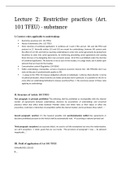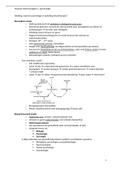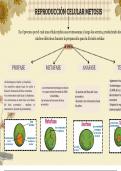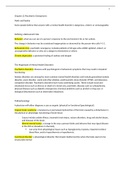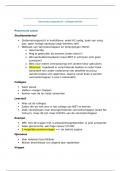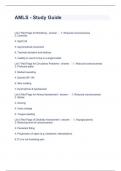Lecture 2: Restrictive practices (Art.
101 TFEU) - substance
I. Context: rules applicable to undertakings
Restrictive practices (Art. 101 TFEU)
Abuse of dominance (Art. 102 TFEU)
Extra: doctrine of combined application: it combines art 3 and 4 TEU and art. 101 and 102 TFEU and
protocol nr 27. Normally articles 101 and 102 are meant for undertakings, however MS cannot undo
the effect of art 101 and 102 by requiring undertakings to enter into cartel agreements by giving them
incentives to enter into cartel agreements, by reinforcing preexisting cartel agreements and copying
them into law or by delegating their own economic power. All of this is prohibited under the doctrine
of combined application. The doctrine is not as such in the treaties, it is judge made, but it builds upon
element that are found in the treaties.
Concentration control (Regulation 139/2004)
Public undertakings, monopolies, services of general economic interest (Art. 106 TFEU)We don’t see
state aid because it predominantly applies to MS.
→ unique in the TFEU: EU imposes obligations directly on individuals + enforces them directly: in terms
of judicial protection, these branches are better protected and in particular, it’s possible for the EU to
come after an undertaking/individual to impose sanctions/fines → the enormous power of these rules
applying to undertakings
II. Structure of Article 101 TFEU
First paragraph: in principle prohibition“The following shall be prohibited as incompatible with the internal
market: all agreements between undertakings, decisions by associations of undertakings and concerted
practices which may affect trade between Member States and which have as their object or effect the
prevention, restriction or distortion of competition within the internal market, and in particular those which ...”
Second paragraph: sanction: it’s the heaviest possible civil sanction(absolute nullity)“Any agreements or
decisions prohibited pursuant to this Article shall be automatically void.” according to national private law!
Third paragraph: exceptions (see separate slides): we used to call this exemptions but since the modernisation,
we call it exceptions → noble -goals that we can invoke .“The provisions of paragraph 1 may ... be declared
inapplicable ...”
III. Field of application of Art 101 TFEU
lOMoARcPSD|2131053
if ...
, Parties: undertakings (see above)
Behavior: agreements, decisions by associations, concerted practices
Object or effect: prevention, restriction or distortion of competition
EU dimension: trade between Member States may be affected (see above)
... then
prohibited as incompatible with internal market
1. Behaviour: types of collusion
1. General
Condition of plurality unilateral behaviour: you need to be two to enter into an agreement. You need to
have at least two undertakings involved (ParkerPenn case). No unilateral behaviour: that’s 102 (abuse of
dominance)
Loss of autonomy: if you lose your autonomy, it’s an alarm bell
No formalism whatsoever: we don’t care about form (of the agreement) in competition law, we care about
substance: as long as you feel bound by it → 'meeting of the minds‘: I know that my autonomy is from now
limited
Cf. text of Art. 101 TFEU refers to "any" agreement ...
2. Agreement
Any agreement in any form possible!
Context irrelevant, (why? we don’t care at this stage because we want a broad field of application, we will care
about it when we speak about the exceptions) qualification and enforceability under national law irrelevant e.g.
gentleman's agreement, articles of association, ....
Horizontal or vertical: "at the same level in the economy ... or at different levels“:
Vertical: at different stages of the production/distribution stages: by definition, more than one
relevant market. It between parties who are not active in the same market. For example: a supplier
and a distributor
Horizontal: active at the same stage: we are full fledge competitors. For example, we are to suppliers,
two producers.
Or ‘hybrid’, cf ‘hub and spoke’ cartels in the retail sector. We are more and more confronted with new forms
of agreements.
Example of a ‘hub and spoke’ cartel: You have a number of supermarket chains and then you have a number
of suppliers, producers. In the cartel, there has been no contact at any moment between the different
supermarket chains: they never talked to each other. There was no contact between the producers: no
horizontal. Nevertheless, prices were fixed. Those supermarkets have teams that compare the prices between
the supermarkets. At one point, the same product is cheaper in another supermarket. The supermarket
contacts the producer and asks to make it stop and says that if it doesn’t, it will delete the products. The
producer contacts the other supermarket and asks to make sure that the price would not be so low. The
producers started policing prices in supermarkets: no horizontal contact. Is it vertical? Yes, but it’s not
,necessarily a cartel: it’s just a talk with its client: it’ hybrid and it’s very difficult to catch, we don’t really know
what to do with it. Uber and its drivers is also an example.
We can argue that it’s a horizontal situation between supermarket whereby the producers acted as
cartel facilitators (Treuhand).
Some states say they see these producers are policing the agreements between supermarkets (= cartel
facilitators). Also cartel facilitators can be sanctioned. Difficulty if cartel facilitator is not active on that
market, can he be fined? Answer is yes.
Other MS don’t care if it is vertical or horizontal, we are going to fine you.
→ Agreement can be a very difficult notion
3. Decision by associati on of undertakings
We know that a cartel agreement is illegal, so we go to the federation and we ask it to impose upon us what
we know that we cannot agree between ourselves. The federation will say that they are free to set up price
but will give as an indication a price. The drafters have foreseen this and have included the decisions of
associations of undertakings.
Decisive = ability, in fact if not in law, to influence members' conduct
E.g. resolution laying down standard terms on which members are required to do business, 'non-
binding' recommendation, decision of association of associations ...
Even non-binding recommendations on prices if they are followed will be caught
The fixing of pricing is the worst it is a hardcore restriction
If we wouldn’t punish decisions by association there would be a perfect loop hole: undertakings can’t enter into
a cartel agreement but ask the federation to do it.
Next move, undertakings can’t enter into a cartel agreement, the federation can also not do it because
decisions are also caught, then we ask the government to impose upon us the cartel the undertakings cannot
into themselves, this is where the doctrine of combines application comes in, the government can’t help
cartels.
4. Concerted practi ce
= 'Contact (meeting of the minds, collusion) but no contract‘. There is a meeting of the minds but there is no
real agreement. This is the most difficult because it often refers to situations of parallel pricing but you don’t
know why the prices are identical or similar, depending on the reason you should fine them or you should
applaud them, it is a thin line between the two.
"A form of coordination between undertakings which, without having reached the stage where an agreement
properly so-called has been concluded, knowingly substitutes practical cooperation between them for the risks
of competition“
, "Coordinated market behaviour which is the result of concertation, a meeting of minds or even merely passive
'contact'“
No plan required, exchange of information may suffice
Not necessary to distinguish clearly from agreements
But...
But relationship parallel behaviour v concerted practice is problematic
Parallel behaviour in itself is not sufficient proof of concerted practice
"The right [of economic operators] to adapt themselves intelligently to the existing and anticipated
conduct of their competitors“ concerted practice if also psychological element, idea of (moral)
obligation
For example: on a particular road, you have several petrol stations and on that particular road, they all charge
the same price (which might be different from what they charge elsewhere); Inbev announces a raise in prices
for beer and the next day, another brewery says that it’s going to follow, and in the end, all the breweries have
the same price. If they follow because they just being rational that Inbev is the price leader and they are the
follower then there is nothing wrong. If on the other hand the reason of increasing price is that they somehow
colluded with inbev as a result of contact then we should fine them.
If this is the consequence of collusion, we will fine them. If, however, it’s only purely rational parallel behaviour,
we will say that it’s good. There’s a very thin line between collusion (heavily sanctioned) and parallel behaviour
that we don’t sanction at all: one can be a price leader and the others can follow.
We need a criteria to distinguish:
The Commission said that it has a criteria: if I see the exact same price, that must be the result of
collusion because two undertaking cannot have the exact same cost structure (the Woodpulp case). If
with different cost structures they nevertheless arrive at similar pricing, that must be the consequence
of collusion.
The Court said: no way: you risk to sanction what we should not sanction: the Commission has to
prove that there’s no other plausible explanation but collusion (burden of proof on the
Commission). This is an impossible prove because you can always find a plausible alternative/possible
explanation: rational economic thinking for example.
Does that mean that we can never be sanctioned for concerted practice since the Commission has such a
heavy burden of proof? No, because the Court added: if, however, the Commission can prove that sensitive
exchange information was sent between the undertakings, then the burden of proof switches. The
undertakings concerned then need to prove that they’ve never acted on the basis upon the information’s that
we exchanged. This is an equally impossible proof to deliver: you can never convince the Court that you’ve
never acted on the information’s even if the information’s were totally false.
→ The Commission has to prove that there’s no other plausible explanation for parallel behaviour but
collusion: impossible to prove. However, if the Commission can prove that the undertakings concerned have
exchanged sensitive commercial information between these undertakings, the burden of proof switches: now
it’s upon the undertakings concerned and they have to prove that they’ve never acted upon that information,
this is an impossible proof to deliver → if you exchange sensitive commercial information’s, you hang!
101 TFEU) - substance
I. Context: rules applicable to undertakings
Restrictive practices (Art. 101 TFEU)
Abuse of dominance (Art. 102 TFEU)
Extra: doctrine of combined application: it combines art 3 and 4 TEU and art. 101 and 102 TFEU and
protocol nr 27. Normally articles 101 and 102 are meant for undertakings, however MS cannot undo
the effect of art 101 and 102 by requiring undertakings to enter into cartel agreements by giving them
incentives to enter into cartel agreements, by reinforcing preexisting cartel agreements and copying
them into law or by delegating their own economic power. All of this is prohibited under the doctrine
of combined application. The doctrine is not as such in the treaties, it is judge made, but it builds upon
element that are found in the treaties.
Concentration control (Regulation 139/2004)
Public undertakings, monopolies, services of general economic interest (Art. 106 TFEU)We don’t see
state aid because it predominantly applies to MS.
→ unique in the TFEU: EU imposes obligations directly on individuals + enforces them directly: in terms
of judicial protection, these branches are better protected and in particular, it’s possible for the EU to
come after an undertaking/individual to impose sanctions/fines → the enormous power of these rules
applying to undertakings
II. Structure of Article 101 TFEU
First paragraph: in principle prohibition“The following shall be prohibited as incompatible with the internal
market: all agreements between undertakings, decisions by associations of undertakings and concerted
practices which may affect trade between Member States and which have as their object or effect the
prevention, restriction or distortion of competition within the internal market, and in particular those which ...”
Second paragraph: sanction: it’s the heaviest possible civil sanction(absolute nullity)“Any agreements or
decisions prohibited pursuant to this Article shall be automatically void.” according to national private law!
Third paragraph: exceptions (see separate slides): we used to call this exemptions but since the modernisation,
we call it exceptions → noble -goals that we can invoke .“The provisions of paragraph 1 may ... be declared
inapplicable ...”
III. Field of application of Art 101 TFEU
lOMoARcPSD|2131053
if ...
, Parties: undertakings (see above)
Behavior: agreements, decisions by associations, concerted practices
Object or effect: prevention, restriction or distortion of competition
EU dimension: trade between Member States may be affected (see above)
... then
prohibited as incompatible with internal market
1. Behaviour: types of collusion
1. General
Condition of plurality unilateral behaviour: you need to be two to enter into an agreement. You need to
have at least two undertakings involved (ParkerPenn case). No unilateral behaviour: that’s 102 (abuse of
dominance)
Loss of autonomy: if you lose your autonomy, it’s an alarm bell
No formalism whatsoever: we don’t care about form (of the agreement) in competition law, we care about
substance: as long as you feel bound by it → 'meeting of the minds‘: I know that my autonomy is from now
limited
Cf. text of Art. 101 TFEU refers to "any" agreement ...
2. Agreement
Any agreement in any form possible!
Context irrelevant, (why? we don’t care at this stage because we want a broad field of application, we will care
about it when we speak about the exceptions) qualification and enforceability under national law irrelevant e.g.
gentleman's agreement, articles of association, ....
Horizontal or vertical: "at the same level in the economy ... or at different levels“:
Vertical: at different stages of the production/distribution stages: by definition, more than one
relevant market. It between parties who are not active in the same market. For example: a supplier
and a distributor
Horizontal: active at the same stage: we are full fledge competitors. For example, we are to suppliers,
two producers.
Or ‘hybrid’, cf ‘hub and spoke’ cartels in the retail sector. We are more and more confronted with new forms
of agreements.
Example of a ‘hub and spoke’ cartel: You have a number of supermarket chains and then you have a number
of suppliers, producers. In the cartel, there has been no contact at any moment between the different
supermarket chains: they never talked to each other. There was no contact between the producers: no
horizontal. Nevertheless, prices were fixed. Those supermarkets have teams that compare the prices between
the supermarkets. At one point, the same product is cheaper in another supermarket. The supermarket
contacts the producer and asks to make it stop and says that if it doesn’t, it will delete the products. The
producer contacts the other supermarket and asks to make sure that the price would not be so low. The
producers started policing prices in supermarkets: no horizontal contact. Is it vertical? Yes, but it’s not
,necessarily a cartel: it’s just a talk with its client: it’ hybrid and it’s very difficult to catch, we don’t really know
what to do with it. Uber and its drivers is also an example.
We can argue that it’s a horizontal situation between supermarket whereby the producers acted as
cartel facilitators (Treuhand).
Some states say they see these producers are policing the agreements between supermarkets (= cartel
facilitators). Also cartel facilitators can be sanctioned. Difficulty if cartel facilitator is not active on that
market, can he be fined? Answer is yes.
Other MS don’t care if it is vertical or horizontal, we are going to fine you.
→ Agreement can be a very difficult notion
3. Decision by associati on of undertakings
We know that a cartel agreement is illegal, so we go to the federation and we ask it to impose upon us what
we know that we cannot agree between ourselves. The federation will say that they are free to set up price
but will give as an indication a price. The drafters have foreseen this and have included the decisions of
associations of undertakings.
Decisive = ability, in fact if not in law, to influence members' conduct
E.g. resolution laying down standard terms on which members are required to do business, 'non-
binding' recommendation, decision of association of associations ...
Even non-binding recommendations on prices if they are followed will be caught
The fixing of pricing is the worst it is a hardcore restriction
If we wouldn’t punish decisions by association there would be a perfect loop hole: undertakings can’t enter into
a cartel agreement but ask the federation to do it.
Next move, undertakings can’t enter into a cartel agreement, the federation can also not do it because
decisions are also caught, then we ask the government to impose upon us the cartel the undertakings cannot
into themselves, this is where the doctrine of combines application comes in, the government can’t help
cartels.
4. Concerted practi ce
= 'Contact (meeting of the minds, collusion) but no contract‘. There is a meeting of the minds but there is no
real agreement. This is the most difficult because it often refers to situations of parallel pricing but you don’t
know why the prices are identical or similar, depending on the reason you should fine them or you should
applaud them, it is a thin line between the two.
"A form of coordination between undertakings which, without having reached the stage where an agreement
properly so-called has been concluded, knowingly substitutes practical cooperation between them for the risks
of competition“
, "Coordinated market behaviour which is the result of concertation, a meeting of minds or even merely passive
'contact'“
No plan required, exchange of information may suffice
Not necessary to distinguish clearly from agreements
But...
But relationship parallel behaviour v concerted practice is problematic
Parallel behaviour in itself is not sufficient proof of concerted practice
"The right [of economic operators] to adapt themselves intelligently to the existing and anticipated
conduct of their competitors“ concerted practice if also psychological element, idea of (moral)
obligation
For example: on a particular road, you have several petrol stations and on that particular road, they all charge
the same price (which might be different from what they charge elsewhere); Inbev announces a raise in prices
for beer and the next day, another brewery says that it’s going to follow, and in the end, all the breweries have
the same price. If they follow because they just being rational that Inbev is the price leader and they are the
follower then there is nothing wrong. If on the other hand the reason of increasing price is that they somehow
colluded with inbev as a result of contact then we should fine them.
If this is the consequence of collusion, we will fine them. If, however, it’s only purely rational parallel behaviour,
we will say that it’s good. There’s a very thin line between collusion (heavily sanctioned) and parallel behaviour
that we don’t sanction at all: one can be a price leader and the others can follow.
We need a criteria to distinguish:
The Commission said that it has a criteria: if I see the exact same price, that must be the result of
collusion because two undertaking cannot have the exact same cost structure (the Woodpulp case). If
with different cost structures they nevertheless arrive at similar pricing, that must be the consequence
of collusion.
The Court said: no way: you risk to sanction what we should not sanction: the Commission has to
prove that there’s no other plausible explanation but collusion (burden of proof on the
Commission). This is an impossible prove because you can always find a plausible alternative/possible
explanation: rational economic thinking for example.
Does that mean that we can never be sanctioned for concerted practice since the Commission has such a
heavy burden of proof? No, because the Court added: if, however, the Commission can prove that sensitive
exchange information was sent between the undertakings, then the burden of proof switches. The
undertakings concerned then need to prove that they’ve never acted on the basis upon the information’s that
we exchanged. This is an equally impossible proof to deliver: you can never convince the Court that you’ve
never acted on the information’s even if the information’s were totally false.
→ The Commission has to prove that there’s no other plausible explanation for parallel behaviour but
collusion: impossible to prove. However, if the Commission can prove that the undertakings concerned have
exchanged sensitive commercial information between these undertakings, the burden of proof switches: now
it’s upon the undertakings concerned and they have to prove that they’ve never acted upon that information,
this is an impossible proof to deliver → if you exchange sensitive commercial information’s, you hang!

